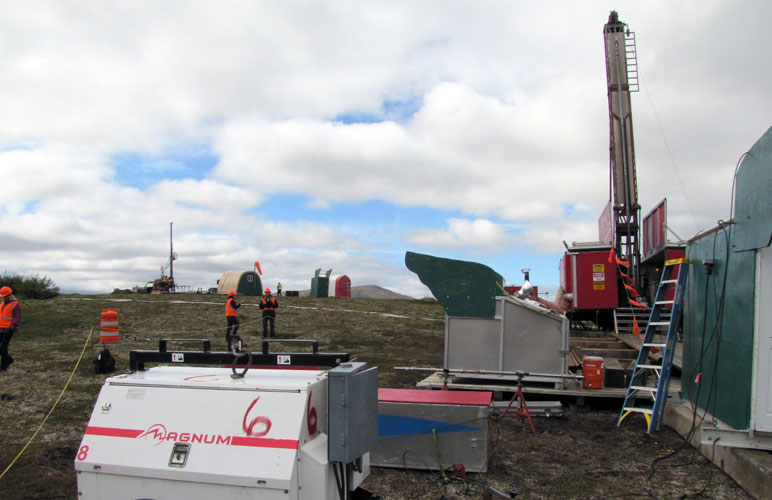Industry-backed Alaska bill could block citizen opposition to big projects
 The Alaska Legislature is considering making it tougher for citizens to use the courts to stop oil, gas, mining or other industrial projects they oppose.
The Alaska Legislature is considering making it tougher for citizens to use the courts to stop oil, gas, mining or other industrial projects they oppose.
The effort is pitting environmentalists against industry, and raising questions about whether only the moneyed should have access to the judicial system.
House Bill 168 comes from Rep. Erik Feige, R-Chickaloon. He’s among those who believe resource development is often hamstrung by frivolous lawsuits lodged by people with an ideological opposition to development instead of those who really believe there’s a critical flaw with a particular project.
Feige’s argument flows not just from his role as an elected official, but also his life at home. His wife, Corry Feige, is general manager in Alaska for Linc Energy and she sits on the board of the Resource Development Council, a pro-development organization that strongly supports HB 168.
The bill would require money up front — sometimes big money — from anyone who wants a project shut down until the courts review whether it’s harmful or if the government properly issued permits for the work. It’s already passed the House of Representatives and recently landed in the Senate Judiciary Committee.
At its core, Feige sees the measure as a jobs bill.
The person filing a piece of paper to temporarily shut a project down while the courts review the case risks almost nothing, while the company backing the job risks everything, Feige said in an interview Thursday. Halting work “can mean real money to real families in our state,” he said.
But opponents question the constitutionality of pricing opponents out of the public process. And there are concerns the bill – which is meant to keep projects humming along – could injure work the state has done to wrest regulatory oversight from the feds.
Skin in the game
Delays caused by drawn out court battles have forced Alaskans out of work in the past. In 2004, an environmental organization that sued in state court to block the Pogo mine successfully interrupted the job, forcing 45 union employees out of work, according to testimony offered this year by Barbara Huff, a representative of Alaska Teamsters.
Feige also cites recent federal challenges to Royal Dutch Shell’s exploration plans on the Outer Continental Shelf in Alaska’s Arctic, where some estimates suggest as many as 700 summer jobs and tens of millions of dollars were lost as a result of court-related delays.
The Resource Development Council (RDC) also points to southeast Alaska’s “decimated” timber industry is an example of the harm ideological challenges can bring to real projects and real people.
Asking petitioners to back their actions with financial risk ensures project opponents have “skin in the game,” council deputy director Carl Portman said during hearings on the bill.
House Bill 168 would require a security bond from that anyone who asks the courts to stop work at an industrial operation. The bond would need to be large enough to cover “payment of wages and benefits for employees and payments to contractors and subcontractors that may be lost if the industrial operation is wrongfully enjoined.”
“Industrial operations” is defined to include “a construction, energy, or timber activity and oil, gas, and mineral exploration, development, and production.”
Feige is quick to point out that civil rules in Alaska’s court system already allow a judge to seek security or a bond from a party. The intent of the legislation, he said, is to direct judges to consider additional items when calculating an “amount the court considers proper.”
“All this bill is doing is reminding the judge and requiring the judge the consider things like wages and damages for particular industrial operations,” he said.
Opponents worry it could force a person trying to take on a big developer over legitimate concerns to fork over millions of dollars to be able to access relief courts can offer.
“I think that requiring a citizen to pay for a governmental error or a corporate misdeed puts a very chilling effect on a long American tradition of protecting whistle blowers in our country,” Andy Moderow, executive director of the Alaska Conservation Alliance, said during a March 20 hearing on the bill.
He also takes issue with the notion that a decision to temporarily halt work on a project would be frivolous, since a judge would have to determine that there’s a reason to believe a whistle blower’s concerns had merit before authorizing an injunction or restraining order.
His point? The situation, to some extent, will already have been vetted by the courts before any stop-work order is issued. Frivolous claims don’t make it that far, but those with merit do, he said.
Moderow calls the bill “yet another attempt to get rid of the ability of Alaskans to protect their clean air, water and land,” and has suggested the measure’s economic deterrence may be unconstitutional.
A veto in Utah
In 2006, a similar bill passed by the Utah legislature was vetoed by then Gov. John Huntsman. Opponents included the ACLU and to some extent the U.S. Environmental Protection Agency.
The ACLU enumerated a laundry list of potential constitutional problems: “Access to the courts, equal protection, federal pre-emption and the right to free speech and association.”
In exercising his veto power, Huntsman said he could not support the measure because it called for “bonding requirements that are not imposed by, and are inconsistent with, federal law.”
After the legislature passed the measure, but before Huntsman nixed the bill, the EPA also raised concerns. Reluctant to get involved in state legislation, the agency felt compelled to speak up because the bill could impact the state’s federally-approved environmental programs – and the EPA had experience with similar measures in Virginia, Oregon and Montana.
An EPA letter to Gov. Huntsman warned “…the pending Utah legislation may created impediments to the public’s ability to challenge permits and other project approvals in state and federal courts as required by various environmental statutes. As you may know, for a state to assume responsibility for federal environmental program, that State must provide the same opportunity for judicial review as would be available under the federal program.”
Unintended consequences?
Critics of Feige’s bill have theorized that Alaska’s hard-fought effort to gain primacy over water-discharge permits might hang in the balance if the bill passes.
“It could be potentially be interpreted as getting rid of a citizen’s critical oversight role as a watchdog over water permits,” Moderow said.
Taking a cue from the warning in Utah, Moderow suggested that abolishing an existing level of citizen input –weakening the process – could give the feds reason to take back control. “I don’t think they did their homework in supporting this bill,” Moderow said of the bill’s backers.
Alaska’s Department of Natural Resources has expressed similar concerns. During a hearing on the bill, Tom Crawford, director of the department’s Office of Project Management & Permitting said it could impact Alaska’s control over surface mining, pollutant discharge, congestion mitigation and air quality programs. He urged lawmakers to carefully consider whether the bill would put Alaska’s primacy over these and other federal regulatory processes at risk.
‘Hogwash’
Feige calls the various arguments against his bill “hogwash.”
His bill doesn’t stop anyone from filing a lawsuit. What it does do is, if that same person also seeks to shut a project down until the case is resolved, require the filer to cover up front the damages to the company and its employees as a result of the delay. If the concerned citizen or group wins the case, they get their money back. If they lose, they don’t.
“It is the option of a litigant to sue or not to sue. The bill does not keep people from access to the courts,” he said.
Feige is hopeful the Senate Judiciary Committee will give his bill a hearing, but with the legislative session fast coming to close, he’s uncertain if it will be among the few that make it to a vote.
Contact Jill Burke at jill(at)alaskadispatch.com
For more stories from Alaska Dispatch, click here.



